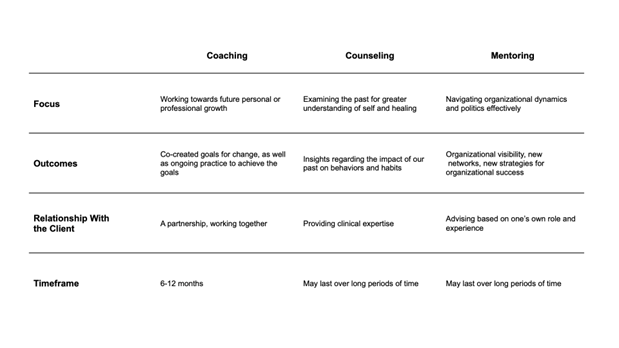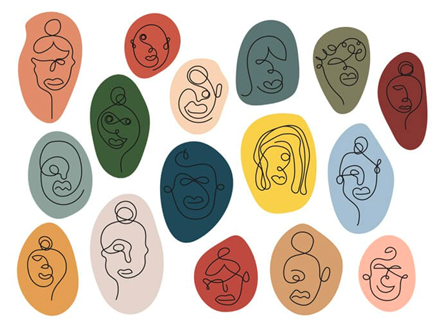Do you ever feel like you’re not making progress in your personal or professional life? Are you considering hiring a life coach but don’t know where to start?

Keep reading! I’ll describe the most common types of coaching. I’ll also share steps you should take to find a great personal or life coach who can help you achieve your goals for change. I’ll describe skills you should expect your coach to demonstrate, whether you are seeking life coaching, executive coaching, career coaching, or business coaching. My goal is to empower you to make an informed decision that can lead to achieving new levels of success. Here’s what we’ll cover:
What is Personal or Life Coaching?
A personal or life coach can play a crucial role in your journey of self-discovery and positive change, whether personal or professional. Your coach should be your partner in defining transformation from within, unlocking your full potential and achieving your desired goals. By providing resources and tools, thought-provoking guidance, and unwavering support, a personal coach empowers you to take control of your life in a positive and meaningful way.
The International Coaching Federation defines coaching as partnering with clients in a thought-provoking and creative process that inspires them to maximize their personal and professional potential. I find that one of the joys of coaching is that the process often unlocks previously untapped creativity and purpose that can lead to new directions in life.
According to Pamela MacLean, a Hudson Institute of Santa Barbara co-founder, coaching can be defined as “helping the client to recognize possibilities for improving oneself.”

Six Benefits Gained From Working With a Coach
Benefit #1 – Clarity
One of the first steps that a coach should take is to help you gain clarity in your goals for change. I have a goal-oriented approach, defining goals as a first step, because it’s difficult to develop a plan for reflection, learning and growth without agreeing upon goals for change.
This exploration of goals should help you develop a deeper understanding of yourself. Why are these goals important to you? What would best outcomes look like? What steps can you take to practice? What assumptions will need to be challenged? Gaining clarity with your coach may involve exploring past experiences as well. What can you learn from your most energizing and draining moments, and how does that learning affect how you move forward?
Benefit #2 – Accountability
Working with a coach as an accountability partner is one of the biggest factors keeping you connected to the coaching journey. With someone to hold you accountable, you’re more likely to stay on track in achieving your goals. Once our first sessions are complete it can be easy to lose momentum because of other commitments. A good coach should be reaching out, keeping you connected, and bringing you back to the importance of your goals, our plan, and your desired change.
Benefit #3 – Unbiased Feedback
A great coach provides a valuable outside perspective. As I work with my clients, I am listening and observing, and may see things that need to be brought to the surface and discussed. As an experienced coach, I can assure you that there’s a skill to providing timely and candid feedback in a caring and supportive way. The question I am most frequently asked by prospective clients is “What’s your coaching style?” I always highlight my obligation to be direct in my communication. I find that this is always met with a positive response; after all, learning more about how others perceive us is a first step to change.
There may be occasions when we agree that feedback is needed from others. In these cases, I may choose an outside assessment such as the Leadership Circle ProfileTM or the MRG Individual Directions InventoryTM. Any outside assessment used is done with the assurance of confidentiality for respondents and confidential and aggregated results provided back to you.
Benefit #4 – Confidence
One of the key outcomes of most coaching engagements is boosting and maintaining your confidence in some aspect of your personal or professional life. I find that in many cases my clients have “old tapes” playing in their head that are based on their previous history and are not serving them well. We bring these “old tapes” to the light of day, examining the role they’ve played in the past and the ways in which they may be affecting current mindset. Simply recognizing the power of these old assumptions about ourselves is a good start. With this understanding and a clear vision for who we aspire to be, we can practice adjustments in mindset and behaviors, that over time, drive greater confidence.
Benefit #5 – Adapting to Change
Life is a journey filled with a myriad of changes—some anticipated, while others catch us off guard. In times of transition, having a skilled coach by your side can make all the difference. You may be experiencing a new job, a new role, a new phase of life such as retirement or becoming an entrepreneur, or even a geographic move. Each of these may present unexpected stressors in our lives. We may experience conflicting reactions to change. Exploring the stages of transition and processing our associated feelings can help us in moving forward.
Benefit #6 – Growth & Development
As you work towards your desired outcomes for change, you will discover insights about yourself. You’ll learn more about what drives you and what drains you. Reflection is a key activity during coaching. We may surface a helpful article to read. We may engage in personal journaling. Whatever form reflection takes should feel right to you. However, discrete opportunities to reflect on what we’re learning, what surprises us, what we’re noticing, etc. is important to your journey. At the end of your work with a coach, you should be developing ideas for how you’ll maintain the changes you’ve made. I will typically ask clients to come to the last session with ideas regarding how they will maintain momentum going forward beyond the coaching engagement.
How is Coaching Different From Mentorship or Counseling?
Coaching, counseling, and mentoring are three separate and distinct interventions with each serving a different purpose. Sometimes you’ll hear these terms used interchangeably. However, there are important differences across the three related to focus, outcomes, and the skills and training of the practitioner.
I find that many of my coaching clients are working with me as well as a therapist or mentor. This arrangement works well; the client receives a different contextual understanding from each. The illustration below describes the differences between these three modalities.

Want to learn more? Listen to David Clutterbuck, one of the pioneers and foremost global authorities in coaching and mentoring, describe the importance of dialogue and co-learning in coaching.
Do Coaches Specialize?
Coaches may decide to specialize in the type of coaching they offer or the types of clients they work with. Many coaches, however, work in more than one area because they have the broad expertise to do so.

Specialty coaches typically work with clients who have goals in very specific areas, such as wellness. Specialty coaches become very familiar with the typical issues faced amongst clients in their area of expertise. These coaches may have specialty training and certifications. He or she is familiar with methods and tools used in this area and the latest research.
In other cases, coaches may practice more generally. I find that there is frequently overlap in the issues clients face. By coaching across several areas I’m able to pull in themes and make connections across different aspects of a person’s life. For example, for an individual wanting coaching in an area of leadership, we may find that stress is a factor and wellness practices are important.
As you consider coaching, think about the types of issues you’d like to address and change you’d like to make. I’ll describe below how to find your ideal coach; use this as a guide to thoroughly assess whomever you decide to work with.
Life Coaches/Personal Coaches
A life coach is a professional who assists individuals in achieving personally significant goals and fostering personal growth. With a holistic approach, life coaches will typically explore various aspects of their clients’ daily lives. Often times, life coaches support clients through life changes or transitions, such as retirement or a new job, guiding them through periods of uncertainty.
Leadership Coaches/Executive Coaches
A leadership coach provides guidance, support, and feedback to leaders at all levels – executives, managers and individuals considering a manager role. This type of coaching focuses on developing the skills necessary for effective organizational leadership, such as communication, problem-solving, decision-making, and team building.
Leadership coaches frequently work with newly promoted individuals or those seeking a promotion. The goal of a leadership coach is to help their clients become more effective leaders.
Business Coaches
A business coach specializes in helping small business owners and entrepreneurs grow their businesses. Business coaches work with clients to identify opportunities for improvement in the business, set goals, devise strategies, identify metrics, and develop action plans to help the client’s business succeed. Typically a business coach can provide guidance on various topics, including marketing and sales, operations, staffing, and finance.
Wellness Coaches
A wellness coach specializes in helping individuals make positive, lasting behavior changes to achieve better health and well-being. Wellness coaching is based on the belief that emotional, mental, and physical well-being are important to success. Wellness coaches often focus on topics such as sleep, nutrition, exercise, mindfulness, etc.
Career Coaches
A career coach works with individuals in making successful transitions in their careers. Sessions may focus on examining one’s career to date and identifying motivations and interests. Assessments may be used to help clarify career choices. Some coaches provide assistance with resume reviews. Your career coach will want to continue to work with you through each stage of career transition, up to and including acclimating to a new role.
How Can You Find Your Ideal Coach?
The ideal coach for you is the person who has the right training and experience and a style that is comfortable for you. Here are steps you can take to find the right coach for you.

Start With Research
When looking for the perfect coach, it’s important to explore various options and consider multiple factors. Cast your net wide. Reach out to colleagues and friends, since they may have valuable recommendations based on personal experience. Additionally, if your company provides coaching services, your manager or HR department may be able to offer a curated list of trusted coaches tailored to your specific needs and goals. Taking the time to gather diverse perspectives and recommendations will ensure you find the ideal coach to support your growth and development journey.
Another option is to look in online directories. Remember that most directories allow coaches to write their own biographies. Several are listed below.
International Coaching Federation
Be Clear About Your Expectations
When starting your search for a coach, it’s important to have a clear idea of what you want to achieve. While your coach can certainly assist you in defining goals, having a preliminary understanding of the specific changes you are seeking can be immensely helpful. Are you aiming to enhance your communication skills, explore a new career path, or perhaps improve your time management abilities? By having a solid grasp of your objectives and desired outcomes, your coach can delve deeper into your goals through thoughtful questioning and assist you in formulating a comprehensive plan for meaningful transformation.
Assess the Coach’s Training and Experience
Once you’ve identified a number of potential coaches, it’s important to thoroughly assess their training and experience. Start by visiting their websites to learn more about how they communicate their coaching brand. Take the time to carefully examine the services they offer and determine if they align with your specific needs and goals. Look for testimonials, success stories, or case studies. Reading testimonials can give you insight into the changes that this coach has facilitated with their clients. Consider the types of clients they have worked with in the past. Will this coach’s expertise provide you with a fresh perspective and enable you to achieve breakthroughs in your own personal growth journey?
Also gauge the coach’s tenure and experience. Look for indicators such as the number of years they have been coaching, the number of clients they have worked with, and the total hours they have dedicated to coaching. Additionally, it is advisable to seek evidence of a credential from the International Coach Federation (ICF), as this serves as a testament to their professionalism and adherence to industry standards.
By carefully considering these factors, you can ensure that the coach you select has a proven track record of working with individuals similar to yourself and possesses the necessary expertise to guide you in achieving the personal growth and development you desire.
Have Initial Consultations
All experienced coaches understand the importance of building trust and establishing a connection with prospective clients. Many offer a valuable opportunity: a free consultation of generally 30 minutes. This initial meeting allows you to explore whether the coach’s style, expertise, and services align with your unique needs and goals.
Prior to the free coaching session, take the time to reflect on the questions that matter most to you. Consider asking about the coach’s training background, their experience working with past clients in similar situations, and how they approach specific challenges. This thoughtful preparation will ensure that you make the most of your time together and allow you to gain a comprehensive understanding of how this coach will support you on your journey.
Remember, investing in coaching is not just about spending money; it’s about investing your time and effort as well. By taking advantage of a free coaching session, you have the opportunity to make an informed decision and find the right coach who can guide you towards success.
For specific questions to ask potential coaches, see my blog titled Questions to Ask a Prospective Coach.

Assess the Chemistry!
Be specific about the style of person with whom you’d like to work. Do you want a style that is more directive? More nurturing? What attributes do you value in colleagues with whom you work? What style will be a good match for you? Remember, this person will be your accountability partner! Successful coaches want you to feel comfortable and confident with them. What type of personality will best help you accomplish your goals?
Consider the values that are most important to you. Then ask potential coaches what values drive their coaching practice, and determine who will truly align with your values. Choosing a coach who resonates with you personally can help you build a stronger bond and greater trust, leading to better communication and understanding.
Discuss Pricing and Packages
It’s important to have a clear idea of your budget for coaching. You’ll want to be able to discuss this with a potential coach. What do they charge? Based on what you’ve described, how many sessions would this coach recommend? Coaches will either charge a per-session fee or may offer packages of multiple sessions, usually at some discount over single-session rates.
Different types of coaches charge different rates. Most life coaches will probably charge in the range of $75 – $200 per session, while leadership coaches may charge as much as $400 – $600 per session.

Most coaches will prepare some form of an engagement letter or proposal for you – don’t be afraid to ask him or her to document their services and pricing in writing.
Skills Your Coach Should Be Practicing
A great coach possesses a variety of skills to guide coaching sessions successfully. The ability to use these skills effectively is what differentiates one coach from another. As you talk with prospective coaches, ask yourself whether these skills are present in the conversation and how they describe themselves.

Maintains Ethical Practices
- Puts the client’s interests first
- Honors agreed-upon commitments
- Maintains confidentiality
Remains Fully Present
- Engaged and remains in the moment with the client
- Notices patterns in speech, reactions, and emotions as they occur
- Avoids a rigid approach; adjusts the discussion flow as needed
Communicates with Curiosity
- Encourages new insights through thought-provoking and open-ended questions
- Listens on all levels – thinks ahead, listens between the lines, notes non-verbal cues
- Recognizes patterns in what the client says and does
- Shares feedback openly and directly
Utilizes an Empathetic Approach
- Maintains continuous positive regard for the client’s journey and goals
- Gives recognition to thoughts and emotions as they arise
- Supportive yet maintains boundaries regarding the coaching role and goals
Practices Self-Development and Learning
- Reflects on learnings gained across clients
- Engages in reflective practices both individually and with other coaches
- Participates in ongoing coach training and education
What Can I Expect During Our First Meeting?
Your first meeting with a coach is an important step in achieving success. The first session is an opportunity for you to get to know each other and establish a strong connection that will help you reach your goals. Before your first session, reflect on what you’d like to accomplish with your coach. While you do not need to have your goals fully formed, it will be helpful if you can generally share with your coach the changes you are hoping to make and your vision for future success.

Expect your coach to ask questions about your background, motivations, and personal or professional choices. Great coaches will start by establishing rapport with you and also learning more about you and your history.
They may also explain their coaching style and provide helpful information about the best coaching process to reach your desired outcomes. At this time, your coach should identify any assessments that may be needed throughout the engagement. And then it’s time to start work! You and your coach will start from your goals and the outcomes you want to achieve, crafting a plan for the time you’ll spend together.
Expect to take away lots to reflect on, and maybe a bit of homework as well! Now that you’ve started your coaching, you’ll find that you’ll be working in session and between sessions too. While insights happen through discussion with your coach, real change happens when you are practicing new mindsets and behaviors between sessions.
Conclusion
Working with a personal coach can be one of the best investments you make in yourself. It’s an opportunity to grow, develop, and strengthen your skillset in order to achieve your greatest potential. Even though it can be a lengthy process to find the ideal fit for you, you can develop a successful, effective coaching relationship when you focus on what’s right for you. Utilize available resources like recommendations from others, reviews, and open communication with potential coaches to make sure the values and approach of your coach align closely with yours. Finally, use an initial session as an assessment to ensure that personalities mesh well together.
And then, commit to the process. You’ve done your research, now it’s time to offer your coach your candor, trust, and commitment. When chosen thoughtfully, working with a personal coach can be highly rewarding and life-changing!

